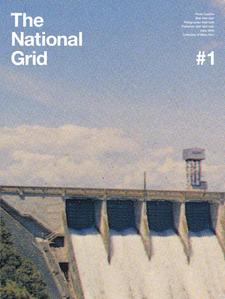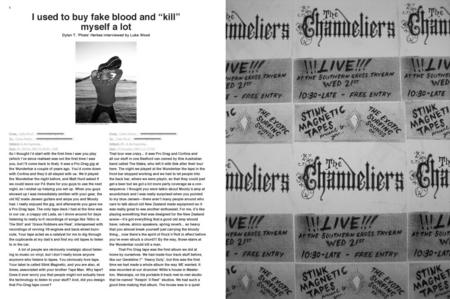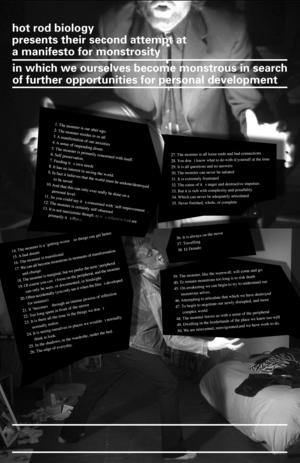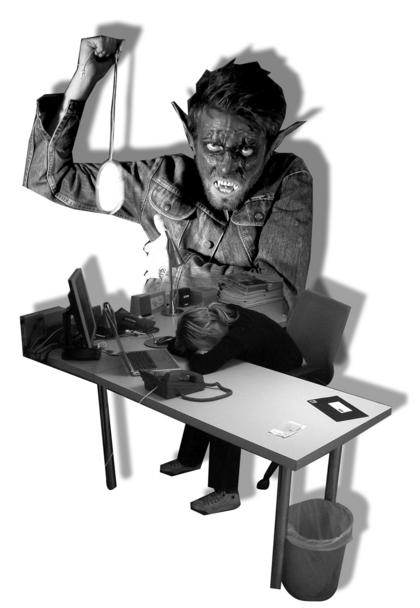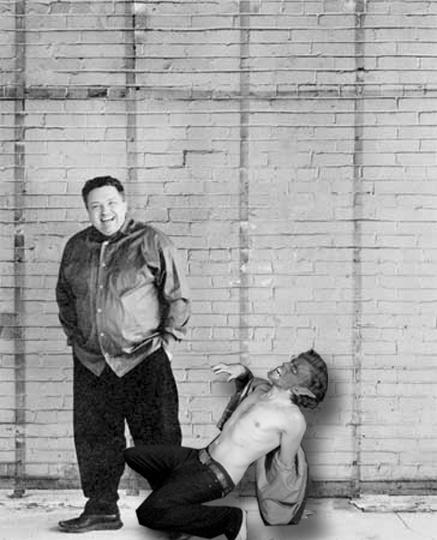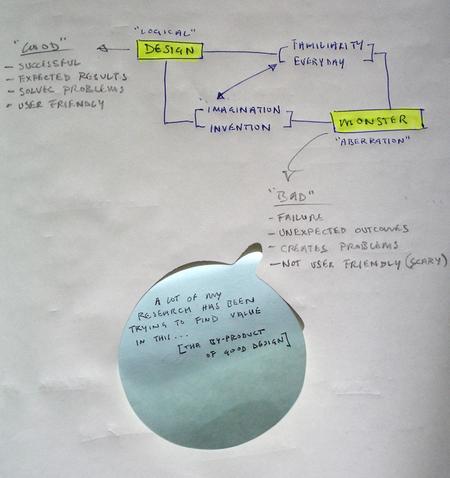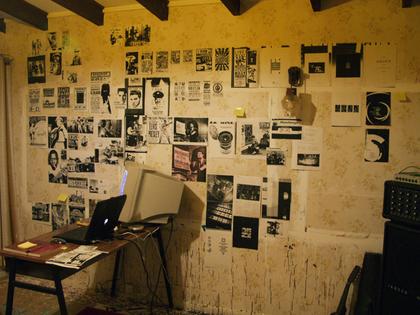« January 2006 | Main | March 2006 »
February 28, 2006
Shedding the monstrous skin? (With particular reference to The National Grid and something Stuart Bailey said)...
I hope Jonty doesn't mind me putting these images up here, but since writing that previous manifesto I've been flat out working on The National Grid. We're aiming at getting it to print on Monday, and it's been a lot more work than I'd naively imagined. It's been a really enjoyable process though... but I'll come back to that, sort of... (this should possibly be two different posts but I'm sure they're related somehow?)
Anyway last night I was talking with Laurene about where I'm at and what I'm up to. She asked what I meant about the 'shedding the monstrous skin' bit in the manifesto, which lead to an interesting discussion about 'coming out' of the Masters... the idea that the methodology I've engaged (reflective practice) has been quite horrific and I've begun to see myself as a monster... but now how to pull out of that (to not "remain monstrous too long") and through the exegesis look at what I got out of being (or attempting to be) monstrous, how it's changed/affected my practice, and how that might be framed/pitched as a 'contribution to the field'. Emilie also has mentioned my need to tie things down... actually she suggested the 'structure' that she saw here. Which is very useful I think... to know what your research looks like to someone from outside.
I guess I'm beginning to quite like the monster though... but maybe I'm thinking of it as a caricature these days and it's more fun than painful perhaps? I definitely want to do the 'Design Wolf studio visits'... I think that'd totally f*cking rock... or the documentation would anyway. But you see what I mean?
Anyway back to The National Grid and an observation I made while attempting to write my part of the editorial for this first issue... I wrote this:
"This whole endeavor really, is the result of us being at a bit of a loose-end. Neither of us were very good at being real graphic designers, I mean we could 'design' ok, but all that other stuff; time, money, people skills? Why we both ended up in education I guess. But we're not entirely happy there either, and we've often joked around about our best students being unemployable. After dinner with Peter and Stuart I Googled them and I found that interview with Stuart where he mentions something about finding an escape route out of design, whereas I think for us this project has been more about finding a way back in."
I don't know if that'll end up in the publication, esp the bit about 'dinner'? I recently freaked out when I realised that The National Grid was looking and feeling very similar to Dot Dot Dot. That's happened quite unconsciously, Jonty and I have looked at it and talked about it a lot... Jonty didn't care as much as I did, and maybe I'm over reacting. Anyway I thought that way in/way out difference 'thing' was important/interesting. I really like Stuart's writing, a lot of what he says resonates with me in the same way as a lot of music I like does... in the way that makes you go, "Damn I wish I'd played/said that". I enjoy his cynicism and I see that DDD is actually very English now, much more than it is Dutch. Rather than try and explain what I mean about the 'ways in/ways out' I thought I'd just copy parts of the interview in here (it's from Speak Up by the way)... and let it explain itself, it seems pretty obvious... my point being that I think we're talking about the same thing (only he says it really well). What I most like is seeing someone put something you felt so succinctly and perfectly... like dinner's always 'nicer' when somebody else has cooked it for you.
Talks about coming from the Netherlands to New York partly because he felt there was no depth there... interesting because I've felt the other way, like coming here was a mistake and that I should have gone to Europe.
"I'm also looking for an escape route from graphic design, which I'm guessing I'm forcing myself into finding... an instinctive phrase; a reflex rather than a plan... sick of hearing myself saying it and trying to work out what it means in practical terms. It's exactly the same as spending two years complaining about wanting to leave Amsterdam. Eventually something gives way and you do it. Geography or work, it's the same thing. Again luckily, I have Dot Dot Dot to work this out with.... you can find a more defined mapping of this disenchantment with graphic design by observing how the magazine has changed."
"I've tried to explain elsewhere how I don't really see graphic design as deserving of being treated as an independent, navel-gazing discipline. It exists entirely in relation to other subjects.... I suspect what I'm really against is what that term "graphic design" has come to represent, i.e. synonymous with business cards, logos, identities and advertising, and, again simply put, those are things I'm just not interested in."
"I think what I do, and what the other people I work with do, is confusing, because it's difficult to place."
"So when I say I'm after an escape route from "graphic design", it's from a "graphic design" defined by those quotation marks, from the self-imposed limitations of what that implies (the self-important "industry" or "profession", its awards and profiles and self-justifying theories...) ... It doesn't start out being a big deal, it only becomes a big deal when a third party - it could equally be a student or a critic - turns it into a big deal."
"That's part of my problem with writing around graphic design: it uses such grand, revolutionary, pompous rhetoric, and in most cases they just don't fit the subject matter. I guess it's because that sort of rhetoric - ideologies, systems, strategies, which seems to ape the language of war and social change - comes from a particular sort of art or architecture writing. When it gets filtered to graphic design, which is mostly everyday and ephemeral, it just doesn't fit right. I find it a bit embarrassing..." [link to the manifesto and evangelism... The Rev. Holden Gunn]
"Although it's true that I've always collaborated on maybe 80% of the work, those collaborations were never planned. I think it's a combination of insecurity and boredom, or to turn those around, it's about the strength of working alongside someone, both confirming or criticizing each other.... You get to places you wouldn't on your own. Will wrote to me recently that a real conversation is one where you genuinely don't know what the other person is going to say next..."
"Well, "choose" is too strong. I know I keep picking at your questions like this, but I think it's important to convey the vagueness with which these things occur..." [I like his vagueness... one of the things that resonates]...
"The clarity only comes in retrospect. At the time they happen without anyone really noticing,..." [noticing in retrospect]
[on working with Will(?)]... "We spent an evening playing each other completely different kinds of music, then decided we should write something together precisely because we were so apparently incompatible"... "The two best pieces of work of anything we've both done are the ones we made together, for precisely the reason that they could have never been made individually. I'm a big believer in those “third ways”, in qualities you can't quite isolate."
..."In Dot Dot Dot 8, Kodwo Eshun wrote: "How fragile it is to form a group, any kind of group. How delicate the task of creating the conditions for a shared belief are." and so it's true: we're on the point of collapse most of the time. " [link to The Grand Saloon... into my enjoying The National Grid project]
"... it's always on the basis of friendships" ... "I made the book Appendix with Ryan Gander, for instance, because we met and got drunk... argued for about eighteen months... The key factor was the trust that all our arguing was leading to a better result."
[on teaching writing] "I'd decided to stop teaching graphic design, partly through feeling a bit uncomfortable teaching something I had doubts about, as expressed above. I realized that what I'd ended up doing after a few years was largely trying to teach writing—I mean in the sense of "designing writing"—disguised as graphic design. That’s fine in itself; I think it's a useful and relevant aspect, and everyone was always cetainly interested..."
"I always relate these things to music, so it's like thinking what's the second album going to be after the rough debut; more studio time, more pressure, bigger egos, drink problems, etc. "
"attempting to convey the more abstract qualities: the vibration, the after-effect, the unexplainable (rather than the inexplicable). In a way it's doomed to failure, but interesting failure. I anticipate ending up with something else altogether, nothing to do with what you were aiming for in the first place. It's about setting up certain conditions to make sure you get lost." [this could have been in my manifesto, re. peripheral!?]
Posted by Luke Wood at 04:26 AM | Comments (4)
February 23, 2006
Another manifesto: The Monstrous Practitioner
Yesterday I tried to do something I've been saying I was going to do since the last talk I gave in Melbourne... rewrite the monstrous manifesto around a broader conception of practice rather than product. I think I left it so long though that this doesn't feel right now.... I've been thinking about what Dave said about leaving the monster behind... maybe I'm beginning to see that now (in the exegesis outline I wrote)... the monster is a skin you shed, a transitional process (39 - 50)...
1. The monster is our alter-ego
2. The monster resides in us all
3. A manifestation of our anxieties
4. A sense of impending doom.
5. The monster is primarily concerned with itself.
6. Self preservation.
7. Feeding it's own needs
8. It has no interest in saving the world.
9. In fact it believes that the world must be undone/destroyed to be saved.
10. And that this can only ever really be done on a personal level.
11. So you could say it's concerned with 'self-improvement'.
12. The monster is certainly self-obsessed.
13. It is not narcissistic though, as it's reflective foci are primarily it's flaws.
14. The monster is a 'getting-worse' so things can get better.
15. A bad dream
16. The monster is transitional
17. We can all become monstrous in moments of transformation and change
18. The monster is marginal, but we prefer the term 'peripheral'.
19. Of course you can't focus on the peripheral, and the monster can only be seen, or documented, in hindsight.
20. Often accidentally (you only see it when the film's developed for instance)
21. It 'becomes' through an intense process of reflection
22. Too long spent in front of the mirror
23. It is there all the time in the things we don't normally notice.
24. It is seeing ourselves in places we wouldn't normally think to look
25. In the shadows, in the wardrobe, under the bed.
26. The edge of everyday.
27. The monster is all loose-ends and bad connections
28. You don't know what to do with it/yourself at the time
29. It is all questions and no answers
30. The monster can never be satiated
31. It is extremely frustrated
32. The cause of it's anger and destructive impulses
33. But it is rich with complexity and possibility
34. Which can never be adequately articulated
35. Never finished, whole, or complete
36. It is always on the move
37. Travelling
38. El Dorado
39. The monster, like the werewolf, will come and go.
40. To remain monstrous too long is to risk death
45. On awakening we can begin to try to understand our monstrous selves.
46. Attempting to articulate that which we have destroyed
47. To begin to negotiate our newly disrupted, and more complex world
48. The monster leaves us with a sense of the peripheral
49. Dwelling in the borderlands of the place we knew too well
50. We are reinvented, reinvigorated,and we have work to do.
I guess I feel like I haven't really cleared anything up with this.
... just stated things I already know. Actually Lisa keeps pointing out to me though that I always hate what I've done, but am able to come back to it in a couple of months and appreciate it... realise, in hindsight, that I did get something from it. Which I actually reference in the manifesto... hmmm...
I guess I worry that calling your research 'monstrous' of course becomes a good excuse for not having to clear anything up... but I have to find something to say. And if I keep going down this road I'm going to need to be able to articulate much more precisely how and why the monstrous metaphor has been, or is, generative. I think 'if' I approach the manifesto again I need to write it differently... rather than a series of short statements, maybe choose particular terms and try and explain them. (Jonty and I are trying to do the editorial for The National Grid like that, so that could be an interesting crossover perhaps?)
Also designing it felt unnecessary, now that it's not really about formal outcomes in particular... which I kind of felt good about. One thing I think I've figured out recently is that my masters should never have been so focused on 'making' (process/artefact), because that wasn't really my problem... my 'problem' was everything else that was going on around the making (peripheral interactions)... that meant that I wasn't finding the making very interesting.
Having said all that though I have played around with designing this manifesto this morning...
I was thinking about turning it into another poster I could stick up around Brooklyn, but I'm not sure now? I don't like the way it looks... but I didn't spend much time on it... all I really wanted to do was try putting the photos with it. I do like the fact that in the bottom image you can see that I've just been putting on the make-up...
I don't know, this feels like something else now... and like I say, maybe it is a skin you shed? Or is it just me hating everything I make? And yeah I see that that is somehow relevant, but I still feel sick in my stomach...
Any feedback on this very much appreciated!
Posted by Luke Wood at 02:46 AM | Comments (5)
February 22, 2006
Damsel in distress...
That's me and that's my friend George. She's a graphic designer too, and we used to work together in Wellington. A while after I moved to Christchurch George moved to New York. I stayed with her for my first couple of months here and obviously we ended up talking about design a bit... I hope she doesn't mind me saying this here, but she hates her job. Pretty quickly after I arrived I began to see George as a good potential test case for my (admittedly vague) ideas about a 'generative practice'... the idea that my search to reinvent/reinvigorate my own practice might translate into something useful for someone else. The question I think this image poses is "how the hell is this guy gonna be helping anyone?"...
I've briefly mentioned the posters we were going to do together... George as damsel in distress, and then me as an evangelical minister type figure, ranting and raving via my manifestoes. We've not got our shit together to do that yet, and I just thought I'd jump in take photos and then start cutting and pasting them together to see what happened... not planning it too much, just creating images and seeing what they lead to.
I think the minister character is a lot easier to figure out which is maybe why I haven't done him yet? Me as a monster, however, seems more problematic... and I guess more interesting. Actually doing this photo shoot of myself last week really regenerated my interest in the monstrous manifestoes... I think partly because I kind of scared myself. Attempting to locate this figure as beneficient!?
I guess all the talk about the perhipheral/marginal got me re-excited about the monstrous again too. Actually also my conversation with Yoko via her blog. I want to sit down and write another manifesto around the idea of the practitioner/me being the monster... I said I'd do this ages ago and then kind of lost interest, but it seems to make sense now. I've even been wondering if the minister figure could be combined with the monster... The Rev. Wolf?
As for George...? Stay tuned...
Posted by Luke Wood at 02:05 AM | Comments (9)
February 18, 2006
Meeting your maker (with particular reference to Bruce Mau)...
Who makes you feel monstrous? How? Why?
What do you have in common? Does that scare you?
I photographed myself as a monster yesterday. I was supposed to be a werewolf... but the make-up didn't really work out looking like that. It concerns me a little that I look more 'demonic' than 'monstrous'... I guess I like the idea that a monster is just kind of misunderstood, and can be rendered useful via some kind of understanding (Dylan mentions this about werewolves in my interview with him). The demon however... hmmm I'm not so sure... pure evil perhaps, but it still works as a manifestation of the peripheral I think. This was kind of a practice run before I do the shoot with George (if we ever get around to it!)... but when I was doing it I realised I was thinking about thinking about why. I've said that I don't want the monster to be a critique of industry, but I thought about what I wrote after the Bruce Mau talk... being in "The Church of Mau", and how I felt like a monster.
Then when I went to find images of him I realised that there's a lot of what he talks about that I actually engage with... like this:
"The studio is the EXCITING thing. The projects are the NECESSARY thing."
and this:
"...every person, every project represents an INFINITELY COMPLEX SET OF RELATIONSHIPS. Finding the exact balance between the right people and the right projects is the key to sustaining a flourishing studio"
from here. Both comments resonate with the way I feel about The National Grid Project.
So I feel monstrous because I don't share an interest in 'saving the world' or in 'the public good'... I feel more destructive than constructive. But yes we do have things in common... an interest beyond 'making'... in practice, and the peripheral interactions that feed that.
Is that scary? Kinda... it makes me realise that maybe I do want to 'save the world'? But I'd say it's in a much more selfish way - it's about saving 'my world', and that I'd be seeking to destroy it in order to rebuild it...
I like things to be a bit fucked up. And that's the difference between me and Bruce I think.
Posted by Luke Wood at 04:16 AM | Comments (5)
February 15, 2006
Peripheral/Marginal (with a loose reference to imagination and innovation)
The word 'peripheral' has come up a lot lately... maybe it's just that thing where you start to see your research everywhere in everything? Anyway I wrote this to Jonty yesterday (in ref to the editorial for The National Grid)...
"... I was thinking about the word 'peripheral' - how it comes up in Noel's piece, and how it could be applied to most of the articles here. Then I thought this thread that's appeared, without our predetermining it, kind of fits in nicely with our ongoing attempts to evolve a manifesto for this project. I guess I quite like the idea The National Grid will be/is peripheral. I like the connection to the optional bits and pieces you attach to your computer, but more generally a 'periphery' is the outer edge, an imprecise boundary of some domain. Our domain is graphic design, and I'd call us peripheralists, as opposed to centralists."
I googled "Peripheralism"...
... and of course it's already a thing (I liked what Emilie said about finding/inventing a word that you then work to define). Most interesting, and pertinent perhaps having just referred to Jonty and I as peripheralists as opposed to centralists, is John Watson, a founder of "Behaviorism". Watson has given the best explanation of Peripheralism in relation to its antonym, centralism. Centralism enlightens that root causes of behavior are to be found in the central nervous system, the brain and spinal cord. Peripheralism pleaded that peripheral events, external to the central nervous system, play a major role in behavior." (also here)
Peripheralism, in psychology, is described as the explanation of psychological events emphasizing peripheral human functions, as those of skeletal muscles or the sex organs, rather than cognition or other processes of the central nervous system. Which of course I really liked, and it doesn't seem to hard to appropriate that idea metaphorically into Design... a discipline that (in conversation at least) values meaning over aesthetics, the function over the form (of course that's rubbish, but it's still fairly pervasive design speak!). But I'm not interested in it in that way... I want to use it in relation to my investigation into practitioner-led research (behavior?). I think there's something there about the 'parts' of your practice you investigate or reflect on. We always focus on what's central - I think we're brought up that way, taught to? In this research however I've often attempted to look at the peripheral... influences outside of, or in the shadows of, the immediate domain of my practice as a designer. (I've been interviewing Dylan Herkes for The National Grid, and I'd like to call Dylan a "peripheral graphic designer", in the sense that the graphic design he does is almost just a by-product of the other things, music and film etc...)
I really like that the definition above, "emphasizing peripheral human functions", recognizes instinctual events (esp sex) as well as those of logic. In my "Inviting The Monster" DVD I talked briefly about the linear (problem solving) trajectory of the 'good design process', where instinct is marginalised. There's a direct link here insofar as my 'monstrous manifestoes' have, at least, been attempts to find value in the tangential and disruptive... the marginal. Sticking with psychology. 'marginal' is defined as relating to or located at the fringe of consciousness. Nice huh...
I've been thinking about 'generative practice'... what that might mean (mainly in terms of my own practice, but in the hope that whatever I learn could be communicated to a broader community of practice). I've been thinking about imagination, innovation, and invention... how these things are related, and how the things I've been doing are attempts at strategic prompts for these, especially imagination (fantasy). I like the idea that imagination is peripheral (becomes 'marginalised' as you become an adult), it's association with play... an extension (keyboard, mouse), expansion of the capabilities of your self. It's about the outer edges, boundaries, limits (monsters and sex). And I think it goes without saying that innovation most often comes from the fringe... the figure of the 'mad scientist', Dr Frankenstein, he leaves medical school because his interests are marginal. And there's a nice twist there... 'marginal' here implies social unacceptability and/or being of little interest, yet it also points to a generative zone of imagination and unknown possibilities - the periphery.
To use this word occured to me in conversation with Lisa. She'd read my attempt at an exegesis plan/outline, and talked about peripheral vision/experience in relation to my mentioning that "the monster has been lurking in the shadowy areas of my research for a while now". I was talking about my realisation of the possibilty that 'I' was both the monster and topic of my research. But here I'm trying to talk more about the fact that I couldn't quite see that... and that somehow that's the point. It's about being able to locate things in hindsight, because when you're 'in it' you are in the centre, and you can never see the periphery clearly, if at all. So in keeping with that train of thought I want to link back to moments where an interest in the peripheral/marginal had already reared it's monstrous head...
Posted by Luke Wood at 09:52 AM | Comments (5)
February 11, 2006
Bad Design (Unbeliever)
Last week I went to an expensive Manhattan 'Design Store' (Moss in Soho) with Ange. It was interesting because I mean I'm a 'Designer', and I'm in a design store, and I absolutely cannot fucking stand it! I'm sorry if this reads a bit teen-angsty, obviously I'm too old for that, but there's nothing I like about it... the products, the store, the staff's uniforms... nothing. Of course I thought about how I've said, usually as a joke, that my research is about 'Bad Design'... and about how, being there in that space I felt like a monster. I thought about something I'd written when I first got here (for an article I was going to write about innovation for The National Grid)...
"Last night I went to see Bruce Mau talk . I assumed it'd be a portfolio show, a chronological 'how I got to be where I am now' kind of thing, but it wasn't, thankfully, and he mainly talked about his latest project 'Massive Change'. I'd seen the book around and I'd flicked through it a couple of times but it hadn't engaged me, either in its content or its design, and I'd left it on the shelf. In the book, and on the stage, Bruce makes it very clear; he wants to save the world. Not surprisingly 'innovation' is what designers have to offer in the race to save the world, and the term was thrown around in relation to all sorts of things from new, more open and collaborative business models for design studios, to the problem of New York's yellow cabs, urban planning, international economies, and - of course - the multi-gazillion dollar question in America right now, New Orleans and the Mississippi Delta. While these are certainly prescient issues - problems to be solved - I was struck by the same feeling I'd had when I was leafing through the book. Boredom. But boredom offset by some kind of anxiety, guilt I guess, that I should care. Sitting in an auditorium with maybe a couple of hundred other designers who, for all intents and purposes did seem to care, I began to feel like a phoney, and I wondered if people could tell. It felt a lot like the couple of times I've been dragged along to a church service and become paranoid that everyone there knew just by looking at me that I was an unbeliever."
I tried to relate this back into my topic...
Posted by Luke Wood at 04:53 AM | Comments (5)
February 10, 2006
Exegesis outline/plan #1 ("Generative Practice")
I've spent the last few days trying to write an outline/plan for my exegesis (which I think is what you call a text that responds to a project-based research program? Not officially a 'thesis'... clear that up for me if you can?). Anyway I wanted to start with the image above - this was the first thing I did within this Masters, an eclectic and disparate collection of photocopied pictures on the wall that I struggled to try and connect - I wanted to talk about how looking back at what I was doing then, a lot of it seems really pertinent or relevant to what I'm doing now.
I talked about how this image reminded me that a couple of years ago I was pretty negative about graphic design, and I'd been trying to get into other things; architecture, music, art, teaching... that basically I was bored, and looking for other things. In hindsight (and specifically in relation to recent projects) what I see here is a map... that looks back at where my practice (as a designer) had come from, and been. I remembered that I'd had high hopes for a Masters... it was a kind of last ditch effort, you know?
In my mind I saw that I could succinctly write my way through it, from 'then' to 'now'... based on the premise that the underlying thread to all my projects/seminars etc was this ongoing attempt to reinvent/reinvigorate my practice. I called it "Generative Practice"... two words that have always had a kind of resonance for me since the early stages of this research. Everything I've done can be bundled nicely into this I thought... the manifestoes, the maps, and the monsters... all by products of the search for richer ground on which to re-establish myself.
Hmmm, that sounds ok to me now? But, as I wrote the outline/plan over the last few days (and maybe I should have planned it first), it just kind of swelled... and I spent hours yesterday editing it down until I became confused and pissed off, because what I thought was fairly clear had turned into a large quicksand of vagueness... I don't really want to put the file on here because I don't think it'd help. Perhaps this 'generative practice' thing is simply too big... a PHD, not a Masters? Maybe I should narrow it down to one particular thread... 'Monstrosity' seems the obvious answer? But it's hard to divorce it from that bigger picture...
...which reminds me, one thing I learnt from attempting to write the outline/plan was that I was interested in how I, as a practitioner, was able to better engage with my practice. There seems to be a lot of talk about how designers engage audiences, but very little about how we engage with our own work... maybe this is something I think about a lot because of my close relationship with students, or the fact we teach design within a fine art school... it's certainly something Aaron and I talk about/around a lot.
Posted by Luke Wood at 02:23 AM | Comments (2)
February 02, 2006
Bless this building [475 Kent Ave, NY 11211]
This morning I had two cups of coffee and performed a little ritual on the roof of the building I'm currently staying in [photos by Ange Gordon]. Some "core emotional release work" so that I can "feel my aliveness". I'll be doing the photo shoots for my posters here I think, and I really wanted to prepare the space spiritually. As you can see we're close to the centre (the vortex), the island that mysteriously sucks you in... shit the twin towers would have been right there behind me. Imagine the amount of therapy that must have been required here after that? Was on the train with Ange yesterday and this attractive young girl right next to us was telling this guy (her boyfriend?) about going to see her therapist... I'm wondering if I could market myself as a 'Design Therapist'? In this city I'm damn sure I could.
Posted by Luke Wood at 03:50 AM | Comments (3)
